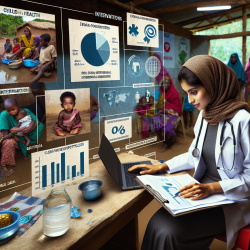Introduction
As practitioners in the field of special education, we are often called upon to navigate complex ethical landscapes. The research article "Researching violence against women and girls in South Sudan: ethical and safety considerations and strategies" provides valuable insights into conducting ethical research in conflict zones. This blog aims to help practitioners enhance their skills by implementing the outcomes of this research or encouraging further exploration.
Understanding the Context
Globally, one in three women experiences violence in their lifetime, with higher risks in conflict zones. The study in South Sudan highlights the unique ethical challenges faced when researching violence against women and girls (VAWG) in such settings. Practitioners can draw lessons from this research to improve their own ethical practices.
Key Ethical Challenges and Strategies
1. Risk-Benefit Assessment
The study emphasizes the importance of assessing potential harms and benefits before initiating research. Practitioners should ensure that their research is necessary and feasible, with benefits outweighing the risks. Continuous assessment and stakeholder engagement are crucial.
2. Methodological and Conceptual Approaches
Developing flexible methodologies that adapt to volatile conflict settings is essential. Practitioners should collaborate with local stakeholders and external experts to ensure that their research is methodologically sound and contextually relevant.
3. Safety Considerations
Ensuring the safety of participants and researchers is paramount. Practitioners must work with local partners to gain access to communities and implement security protocols. Continuous monitoring and adaptation to changing security contexts are necessary.
4. Analysis and Research Uptake
Effective dissemination of research findings is crucial. Practitioners should develop multiple research products tailored to different audiences, ensuring that findings are presented in a way that minimizes risks to participants and communities.
Practical Implications for Practitioners
- Engage Stakeholders: Collaborate with local and international stakeholders to align research priorities and ensure findings are relevant and actionable.
- Prioritize Safety: Implement rigorous safety protocols and continuously assess risks to protect participants and researchers.
- Adapt Methodologies: Develop flexible research methodologies that can adapt to changing contexts and ensure the ethical conduct of research.
- Disseminate Responsibly: Tailor research dissemination to specific audiences, ensuring confidentiality and minimizing potential harm.
Encouraging Further Research
Practitioners are encouraged to delve deeper into the ethical challenges of researching VAWG in conflict zones. By understanding and implementing the strategies outlined in the South Sudan study, practitioners can enhance their skills and contribute to the global effort to address violence against women and girls.
To read the original research paper, please follow this link: Researching violence against women and girls in South Sudan: ethical and safety considerations and strategies.










